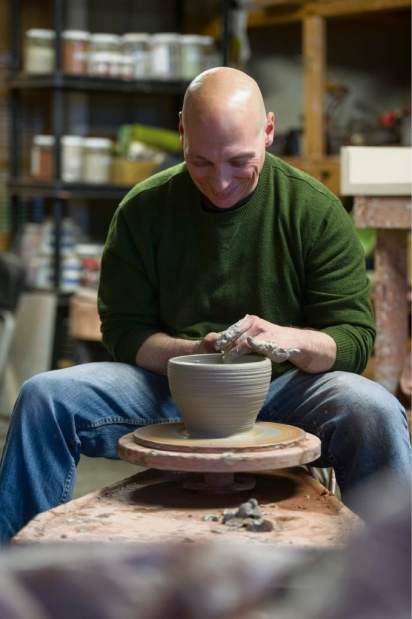DeFabo crafts path from doctor to potter
Dr. Francis DeFabo of Unity is making clay tableware for his daughter's April 1 wedding dinner. At four dishes each for 200 guests, that's 800 pieces. He started in January and will finish just in time for the nuptials. It seems like a lot, but he says, “I see patients three days a week and I'm potting on the other days. I pretty much do it constantly when I'm not seeing patients.”
DeFabo's obsession with pottery began about six years ago when he gave up the baby delivery part of his OB/Gyn practice with Athena Women's Care in South Greensburg. He started out giving his work away. Now he sells at Latrobe Art Center, Ligonier Country Market and Main Exhibit Gallery in Ligonier; during a yearly open house in his home, and at fdpottery.com.
Question: How do you go from doctor to artist?
Answer: I've always had a creative mindset but never had the opportunity to do much with it. Through college and grad school, it was all math and science. In college, I saved one elective to take a figure drawing class and I was so excited about it, but halfway through, the professor said, you're wasting my time and yours — go back to science. When I was in solo practice as an OB/Gyn, I didn't have time. When I stopped delivering babies and our kids were all grown and gone, I decided to try something.
Q: What was your first step?
A: I took a class at Pittsburgh Center for the Arts that was supposed to be open to all levels, but I didn't realize that everybody else had been potting for a while and I didn't even know how to take the clay out of the bag. The other people in the class took pity on me and helped me.
At the end of that class, I still couldn't center the clay on the wheel, but I just enjoyed it so much that I thought, I could learn to do a stat C-section, I could learn to operate on a woman with ovarian cancer, surely I can learn to turn this lump of clay into a bowl.
The husband of a patient of mine heard that I was interested in potting. He gave me a mug he'd made and said, I have an extra pottery wheel. If you buy it from me, it will come with three lessons. He came over on Saturdays, and he was so patient with me. That's when I really took off.
Q: What appeals to you about potting?
A: Up to that point (when I started potting), my life had been so structured that I liked the idea of the malleability of clay. There's something about the wheel spinning around that is meditative. You get a result quickly. You take a lump of clay and suddenly it turns into a bowl or a platter.
The other thing that's cool about it is that I don't think there's the same pressure as, say, in woodworking. If you're making a bowl and it doesn't work out, you smash it down and start over. If a woodworker is turning a bowl out of a beautiful piece of walnut and something goes wrong, all they have is expensive sawdust.
Q: Describe your work.
A: I like doing functional pieces. I like making something that can be used. I grew up in an Italian family, and for them food is such a big thing. When I'm making pots, I really think about how they can be used for food.
I make ravioli bowls because my mom would always make big dishes of ravioli at Christmastime or other holidays. My wife is also a great cook, so I make stuff that will work for her.
Q: When did you decide it was time to start selling?
A: At first, I was just giving things away. My wife finally said, we've got more pots than we have friends. You need to find another way to get rid of this stuff.
I also donate to pottersforpeace.org. They teach people in Third World countries who are native potters to actually make a living by selling their pottery. I donate a portion of my sales revenue to their water filter project. They teach people to make terra cotta water filters in places where they don't have potable drinking water. The money they bring in really goes toward doing good work and not just paying executives.
Shirley McMarlin is a Tribune-Review staff writer. Reach her at 724-836-5750 or smcmarlin@tribweb.com.

